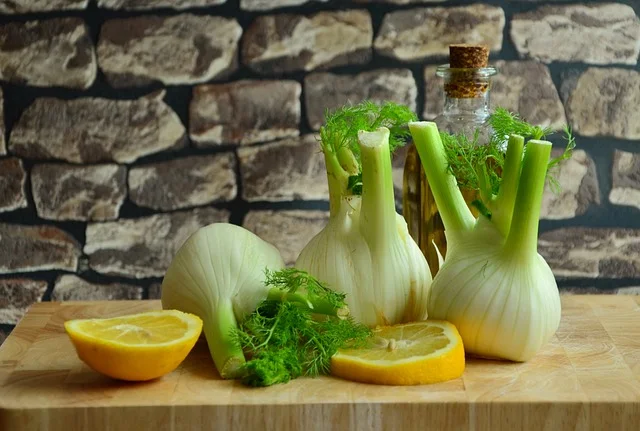- Get link
- X
- Other Apps
- Get link
- X
- Other Apps
Fennel is a delicious vegetable and culinary herb that grows widely in the Mediterranean region. While fennel bulb and seeds are both enjoyed for their unique flavor, it turns out this plant also possesses many impressive health promoting compounds. In this in-depth look, we’ll explore fennel’s nutritional profile and how regularly eating this versatile veggie can benefit your wellness.
Nutritional Powerhouse
Perhaps the biggest surprise about fennel is just how nutritious it is. In a single cup of raw bulbs you get:
- - Fiber (4g): Mainly insoluble fiber to promote regularity, ease constipation and keep you feeling full.
- - Vitamin C (26% DV): Boosts immunity, aids iron absorption, and protects cells from free radical damage.
- - Potassium (10% DV): Vital for blood pressure regulation, muscle function and nerve signaling.
- - Manganese (15% DV): Required for energy production through metabolism and antioxidant defenses.
- - Vitamin B9 (Folate, 10% DV): Essential for DNA synthesis and preventing birth defects.
- - Copper (8% DV): Works with iron to form red blood cells and helps produce collagen.
- - Vitamins K and A (Small amounts): Bone protection and eye/skin health respectively.
So one serving of fennel delivers a good balance of nutrients to support overall wellness. The phytonutrients it contains provide even more health promoting properties.
Heart Helper
Fennel shines when it comes to cardiovascular benefits. Its fiber helps regulate cholesterol levels by trapping and removing excess from blood vessels. Phytonutrients like polyacetylenes provide antioxidant protection for LDL particles to lower heart disease risk significantly over time.
Research backs fennel’s ability to lower hypertension as well. The potassium in fennel balances excess sodium intake, while anti-inflammatory effects soothe arterial walls to improve blood flow. Animal studies even found polyacetylenes blocked atherosclerosis development.
So enjoying this veggie a few times weekly can aid your ticker naturally through these cardioprotective mechanisms. The fiber also promotes regularity to flush out toxins linked to plaque buildup efficiently. Overall this makes fennel a true ally for keeping inflammation in check throughout your cardiovascular system.
Smooths Digestion
Fennel boasts some fascinating properties to enhance gastro-intestinal health through multiple pathways:
Relieves Cramps and Bloating
The compound anethole is largely responsible for fennel’s carminative effect to relax intestinal smooth muscles and dispel cramps, gas and wind pains.
Soothes Ulcers
Anethole, fenchone and other elements demonstrate anti-ulcerogenic effects in rats, healing sores formed in the lining of the stomach and small intestines.
Quells Inflammation
Anti-inflammatory antioxidants like flavonoids protect and repair the digestive mucosa from damage. They also dial down chronic low-grade inflammation present in many GI disorders like IBS.
Reduces Regurgitation
Anethole promotes lower esophageal sphincter tone in studies, keeping acid and contents securely contained in the stomach where digestive enzymes await.
Alleviates Diarrhea
The soluble fiber produces butyrate as a byproduct, fueling the cells that line the colon for improved motility and stool bulk/consistency.
So for digestive distress from acid reflux to IBS, indigestion or constipation, doctoring up meals and drinks with fennel may solve symptoms safely and naturally.
Cancer Fighting Compounds
Emerging research links fennel’s unique medicinal plant chemicals to anticancer effects at the cellular level through multiple modes of action. Researchers remain optimistic these findings may eventually lead to fennel-based treatments:
Blocks Cell Proliferation
Sesquiterpene compounds called gigantene and neoolivetol induce lung, breast and colon cancer cell death while halting new growth in lab studies.
Inhibits Angiogenesis
Fennel’s essential oils like anethole prohibit new blood vessel formation that tumors require to receive nutrients and metastasize.
Halts DNA Damage
High antioxidant polyacetylenes in fennel prevent carcinogen activation and neutralize free radicals before they damage cellular DNA – the initial step in cancer formation.
Detoxifies Carcinogens
Dianethole and photoanethole contain apoptotic properties that prompt cancerous or precancerous cells to self-destruct on their own accord via enzyme induction in the liver.
While more human trials are still warranted, the diverse antioxidant and antimutagenic effects of fennel make it a powerful weapon in fighting cancer from multiple angles according to current in vitro evidence. Consistent eating may help reduce overall long-term cancer risk.
Boosts Immunity Naturally
Fennel lends itself well to keeping your immune defenses strong and disease-resistant through several mechanisms:
- Vitamin C content maintains and produces white blood cells for swift responses against pathogens.
- Manganese supports enzyme production and cellular metabolism within immune T-cells, B-cells and macrophages.
- Anisfuroside works as a natural antibacterial to protect oral health and ward off infections.
- Anti-inflammatory effects help control chronic inflammation that can weaken immunity over time.
- Compounds like rutin protect and stabilize mast cells from overreacting, balancing allergic response.
So for a vitamin C and mineral-rich immunity boost, don’t underestimate fennel’s value. Its concentrates even enhance antibodies and complement proteins involved in responding to bacterial toxins.
Additional Health Perks
A few lesser known ways fennel benefits your overall wellness include:
- Estrogenic plant chemicals may curb hot flashes and strengthen bones during menopause.
- Potassium aids nerve conduction for smooth muscle function like controlling eye pressure.
- Folate content supports neurological health in the form of DNA synthesis and methylation.
- Ayurvedic principles describe using fennel for weight loss by enhancing metabolism and suppressing appetite.
- Traditional medicine relies on its expectorant nature to clear lungs and soothe coughs/congestion.
In Summary
With anti-carcinogenic, antioxidant, antibacterial and digestive soothing elements, regular fennel consumption appears to contribute meaningfully to disease prevention. It remains one of nature’s most well-rounded allies for whole-body wellness. Enjoy fennel raw, roasted, juiced or within various recipes to reap these impressive nutritional benefits.



Comments
Post a Comment